Ten years after his parents passed, Tarfa Jason Benson started scribbling words in a notebook, beginning a story he did not know how to finish. He was 17. He did not always want to be a writer. As a child, he wanted to be a soldier, or a pastor, or “anything I saw on TV,” he tells me on the phone in early February. “I was really captivated by what I saw on TV.”
He was captivated by books, too. He read everything from Ladybird versions of European fairy tales to newspapers, from X-Men and Marvel comics to prescriptions on bottles. He read Zainab Alkali’s The Stillborn. “It was a pleasant shock,” he remembers. “Until her, I didn’t know Nigerian life was interesting and worthy enough to sit in the pages of a book.”
In primary four, aged eight, he read Snow White and disagreed with the storyline. Seeing the passion with which he disagreed, his father, a site engineer and artist who taught him how to draw faces, gave him a jotter and a red pen to write his version. “I felt powerful,” he recalls. “I could create my own world.”
After junior secondary school, Benson wanted to be an actor. But his foster parents and teachers decided he was “too brilliant to go to the Arts class,” so they put him in the Science class.
In 2008, turning 17, he went to Federal University of Technology, Minna, to study Quantity Surveying, a course his guardian chose because he saw a newspaper advert that read: “44 Quantity Surveyors Needed in Germany. Please Apply Within.”
It was at that point in his life that he started scribbling words in a notebook, telling the story that would become The Madhouse, his debut novel.

The Madhouse is set in the 1990s—TJ Benson was born in 1991—the last decade of military rule in Nigeria. On 12 June 1993, the business mogul and philanthropist MKO Abiola won the first democratic presidential elections in Nigeria since the military took power. Ibrahim Babangida, the military dictator who had been in power for eight years, annulled the elections, and Ernest Shonekan, a Nigerian lawyer, briefly headed the Interim National Government for three months before the military coup by Sani Abacha. In 1999, Nigeria transitioned into a democracy.
Moving and beautiful, The Madhouse is the story of a family: the father Sharriff, the mother Sweet Pea, and their children—Max and André, the brothers, and Ladidi, their sister. Each of them battles demons. At its heart is the unusual love story of Sharriff and Sweet Pea, who find each other by miracle, tied in matrimony by the titular “Madhouse” where they lived. Structurally, the book is a gathering of several stories. Each section is a character’s story. “You can’t get the full picture until you read the entire book,” Benson explains.
Benson weaves good sentences: “Sprinkled with stars the sky seemed wider, and the moon was so large they could see the imprinted face of Mother Mary looking down on baby Jesus”; “She painted heartbreak once in those early days, probably her first canvas.”
He began The Madhouse “without any sense of location,” working with “some kind of projection.” He said, “Most of my stories are set in places that I’ve never been to before. That’s a way of me to travel or go on adventures.” Later when he saw that “the default for most Nigerian writers” is to set their stories in Lagos, he decided to set the novel in Kaduna, a northern Nigerian city his biological parents brought him to as a child but which he would not visit as an adult until 2017.
“I wanted a quiet place,” Benson says. “You know a place is in-between the physical realm and our psychological experience; it’s about how much psychological landscape I can cover in one geographical location. Places work with the writer to produce stories.”
Real-life developments appear in The Madhouse. In 1996, the meningococcal meningitis epidemic wounded Kano, the biggest city in northern Nigeria. There were 11,717 deaths from 109,580 cases. Enter Pfizer, a pharmaceutical company that gave a number of children a skewered dosage of its antibiotic, trovafloxacin, and gold-standard ceftriaxone, using the children for trial without letting their families know. Eleven children died.
The Pfizer tragedy contributed to the novel’s characterization of Sharriff, who, paranoid, wouldn’t let his children be vaccinated. He had been to Liberia to keep peace; he wrote about his experience in epistolary form, addressed to his wife, who asked him to publish it. He did, and the military government wouldn’t let him rest. He was not going to take any chances.
Another tragedy in the novel is the Miss World Riots of 2002. After Agbani Darego became the first Black and African to win Miss World the year before, the Nigerian government committed to hosting the next event in Abuja. But many Muslims insisted that the pageant was “unchaste” and could not be held because it coincided with the Islamic holy month of Ramadan. A 22-year-old reporter Isioma Daniel wrote an article that referenced the Prophet Mohammed. The Islamist government of Zamfara State put a fatwa on her head and riots ensued, claiming over 200 lives. In the book, the riots are costly to the family.
“I don’t know any Nigerian book of literature that has touched on that,” Benson says. “Anybody who lived in Kaduna would tell you they knew someone who disappeared in that crisis. But we don’t question it. People feel like it’s in the past, it’s too far away, history. Some of these major events that happened in the ’90s are not archived. In a way, The Madhouse and most of my longer pieces are a sort of archiving of these. My focus is people of my age. I want us to remember what it was like in the ’90s.”
Benson explores intimacy in a variety of forms—sexual, filial, almost incestual. “In this book, the people are conscious of their bodies,” he says. André, for instance, names his penis Augustine; Max is disconnected from his body; and Sweet Mother paints on Sharriff’s body. But he was particularly interested in male intimacy. “Brothers nurturing each other. Fathers and sons having softness for each other.”
This deliberateness allows for a complex and emotionally resonant tale of two brothers. When Benson writes about André and Max, the words leap off the page like birds of prey; each one becomes a tooth. Like when Max, just returned from boarding school, watches his brother play on his guitar—this boy he used to save from brutal dreams, this boy he cuddled every time the “spiritual” forces made him whimper—and he comes to the devastating realisation that “he has lost his brother forever.”
For the nine years he wrote The Madhouse, TJ Benson worked on other manuscripts. He didn’t have a laptop for most of those years. He carried notebooks in which he scribbled drafts of all his manuscripts. Around 2012, his friend David Ishaya, a poet and photographer who also attended the Federal University of Technology, Minna, introduced him to submitting work to journals and to photography. (Benson’s father had gifted him a KodaK camera for his ninth birthday, which he took to school and, during break, used to snap his classmates, posing. An uncle “borrowed” the camera and never returned it.) In 2015, he published Rituals, a small collection of photographs, with Sankofa Mag.
In 2016, he lived in Donga, Taraba State, for his National Youth Service. He taught Introductory Technology to secondary school students, many of them survivors of massacres, some of them living with PTSD, and gave extra lessons in English and Literature. There, he began writing We Won’t Fade into the Darkness, a collection of speculative fiction. He wrote everywhere—barbershops, buses because he “didn’t have the convenience of writing in a quiet place.”
In the book, Benson imagines what Nigeria could look like some decades from now while mirroring what is currently going on in the country: the killings in Taraba, the oil problem in the South-South. In some of the stories, Nigeria is technologically advanced; in others it does not even exist anymore, absorbed into a larger state.
When he completed the manuscript, he borrowed a laptop, typed it, and submitted it for the Saraba Manuscript Prize. It was shortlisted, to his surprise. “I didn’t expect it to be published in Nigeria, because of the genre. I thought people wanted to read ‘serious books.’”
And then they sent him the shortlist money, the first time he was paid for his writing. “I remember seeing the 100k. I remember that vividly. I was really shaking.”
Before then, he had published pieces in magazines but no editor sent him a pay check. “It was driving me crazy. People were telling me—O, you are talented,” but nobody was paying him for what he wrote. “There was a point I did a miniseries,” he remembers, “and I was trying to sell each episode, each treatment, for 600 naira. Either 600 or 1000, I’ve forgotten.”
He continues: “I feel like some of the most talented of us have stopped. Because—what was happening? Which publishers were interested in our manuscripts then? Where are you submitting that is going to pay you? Maybe there is one small prize and then everybody is fighting for 30K, 50K, and then that’s all. And I want to assure you that we really pushed.”
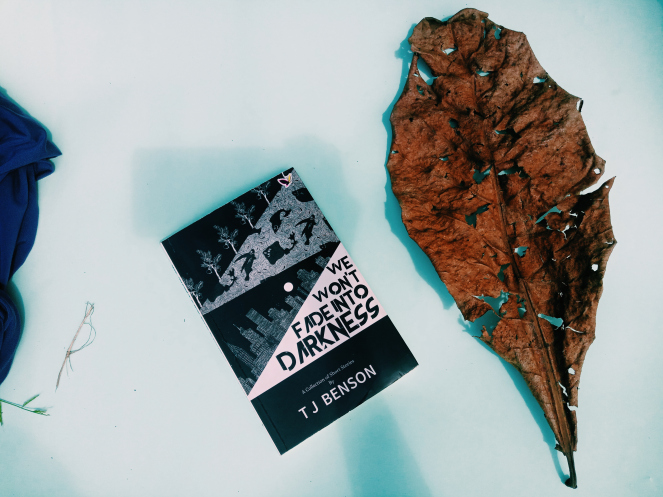
We Won’t Fade into the Darkness was published in 2018 by Parrésia Publishers. In a blurb, the novelist Emmanuel Iduma, the editor of Saraba, wrote: “His writing pulsates with the urgency of a present moment. His stories are written in prose rinsed in empathy, and with an ambition that makes me shudder in expectation for his future work.”
Benson has decided not to write a memoir, at least not until he is well into his 30s. “The question is,” he says, “is the world deserving of my personal story?”
For the fantastical in his writing, TJ Benson is indebted to Ben Okri, who “localised wonder for me.” He says: “If Ben Okri’s writing did not exist I don’t think I would have come as far as I did, in my craft generally. I wouldn’t have been able to personalize writing in the context of African spirituality.” For language and writing everyday life, he credits Annie Proulx.
Contemporary influences are Akwaeke Emezi and Lesley Nneka Arimah, whose storytelling has “a contemporary Nigerian-ness” and “made me look inward.” Toni Morrison and Earl Lovelace are also major influences. As is Michael Ondaatje, whose The English Patient influenced the structure of The Madhouse.
Benson regularly teaches workshops. He taught one online from 2016 to 2019, when The Madhouse was accepted by Penguin Random House South Africa and in Nigeria by Masobe Books. For Lolwe, a Kenya-based online magazine, he will be teaching a four-week Magical Realism and Surrealism class, which he says will “remove the Western gaze/framing of these genres.”
Workshops, he says, are “the greatest joys of my career. You know when people who wrote stories in my writing classes get published in places that rejected me. I can’t tell you, I’m smiling now. It’s more of facilitating.”
Last year, a writer who participated in a Benson workshop, Innocent Chizaram Ilo, won the Commonwealth Short Story Prize for Africa Region. Benson, Ilo says, “puts in the fucking work.” Howard Meh-Buh, winner of a 2020 Miles Morland Scholarship, agrees: “I think he is always finding new ways to tell stories.”
Tolu Daniel, a friend and editor who published Benson’s early work, says the same. “He is never afraid to veer to the experimental,” he writes. “I know him to be one of the most hardworking writers of our generation.”

Hope and The Absence of Hope are important to TJ Benson as a person and as a writer. He doesn’t have a lot of the stuff himself. “If I had [hope] I’ll probably be contesting for a youth chairmanship somewhere in Nigeria,” he laughs. “If I had this hope I’d have finished The Madhouse a long time ago. I write stories because they torture me. I was always hearing them. Stories were always shouting. So I had to write them down. That is why I produced a lot back then. It wasn’t out of hope of completing or finishing anything.”
Getting it done is the most exciting part of writing for Benson—not the publication, or the accolades, or even the reception of the book. “When I get it out of the way, I sigh,” he sighs. “For me that is the achievement.”
He had no intention of publishing The Madhouse when he started it. “[It] was going to be a book I will read to my children,” he says. When it came out, he felt that it was no longer his. This feeling so overwhelmed him that for two days he felt “sick in the stomach. I couldn’t reconcile the big book in my hands to an idea that I had wrestled with for nine years. But I am gradually beginning to embrace it as my baby.”
At first, he wished it had been published earlier, but on second thought he thinks this time is right. “You take note of the mood of the world when the material is coming out. If you are publishing a political novel, the way it would perform in, say, an election year would be different from how it would perform in another year. The Madhouse is out now and people are making references to the fact that the father, Sharriff, is not open to vaccination. Timing is a very interesting thing when it comes to the release of a book.”
His next book is the first long manuscript he ever completed—before this he wrote a small YA novella which got heavily rejected—a novel titled “People Live Here,” forthcoming next year. It is written in “an entirely different style” and “an entirely different language.”
“You always start from hope,” Benson tells me. “You always start from hope. Like, is this possible? There’s that huge risk involved. And I have failed sometimes, I fail at it sometimes. But, also, sometimes it is successful.” ♦
Edited by Otosirieze Obi-Young.
BUY
More Big Stories from Open Country Mag
— How Tsitsi Dangarembga, with Her Trilogy of Zimbabwe, Overcame
— With Novels & Images, Maaza Mengiste Is Reframing Ethiopian History
— Nigerian Literature Needed Editors. Two Women Stepped in To Groom Them
— Mark Gevisser‘s Long Mission of Queer Visibility
— Hannah Chukwu’s Call to Help Uplift Unheard Voices
— How Lanaire Aderemi Adapted Women’s Resistance into Art

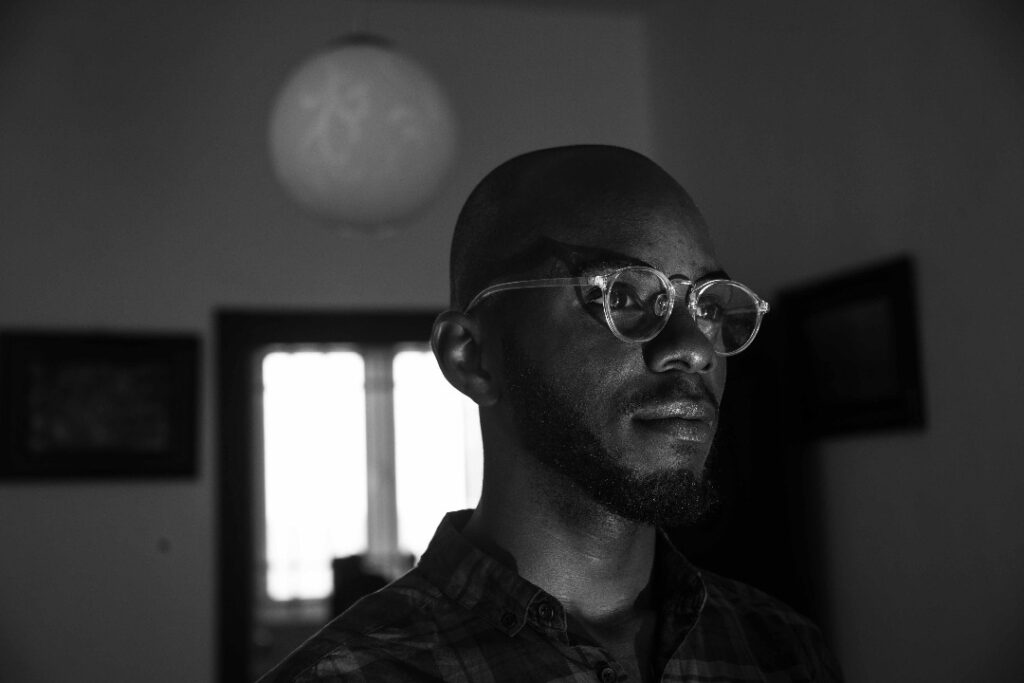
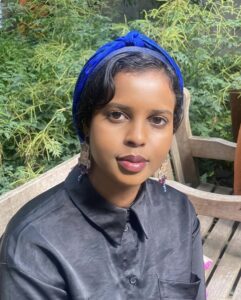
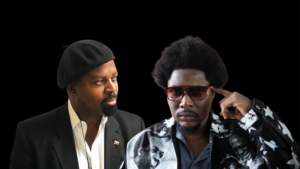
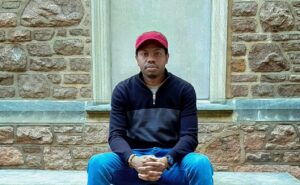
One Response